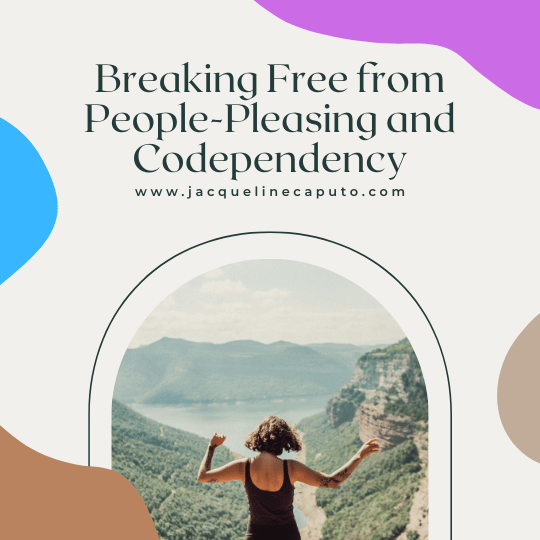The Hidden Link Between People-Pleasing and Manipulation
When you think of common pairings, certain combinations likely come to mind right away:
- Peanut butter and jelly
- Spaghetti and meatballs
- Two peas in a pod
But here’s one you might not immediately consider: People-pleasing and manipulation.
Most people associate people-pleasing with being overly nice, avoiding conflict, or getting taken advantage of. While that’s part of the picture, many people-pleasers also struggle with disordered eating—such as binge eating or restriction—as a way to cope with unmet emotional needs or the pressure to be “perfect.”
But manipulation? That’s where people start to raise their eyebrows.
How People-Pleasing is a Form of Manipulation
Here’s the truth: People-pleasing is one of the highest forms of manipulation.
Think about it this way:
- If I do what I think you want me to do, you’ll like me.
- Because I can’t tolerate the idea of not being liked, I’ll manipulate your perception of me to maintain your approval.
It’s exhausting, unsustainable, and ultimately a lose-lose situation for everyone involved.
The Fear of Prioritizing Your Own Needs
Recovering people-pleasers know the paralyzing fear that comes with putting their own needs first. Even admitting what you want can feel like breaking an unspoken rule.
In many ways, recovering from people-pleasing and codependency is similar to overcoming any other addiction. Like substance-related addictions, process addictions (such as codependency) follow a structured path to recovery.
Let’s explore the stages of healing and how to break free from these patterns.
Stages of Recovery from People-Pleasing and Codependency
1. Awareness and Acceptance
You can’t change what you don’t acknowledge.
This first stage involves recognizing your patterns of people-pleasing and codependency and understanding how they impact your life. Ask yourself:
- Do I apologize to inanimate objects when I bump into them because I’m worried they might be upset?
- When someone asks me what I want, do I feel panicked or indecisive?
- Do I say “yes” to unreasonable requests out of fear of disappointing someone?
- Am I constantly scanning others’ moods while ignoring my own feelings?
If these questions resonate, you might be struggling with codependency.
2. Education and Understanding
Once you identify the problem, it’s time to understand its roots.
Educate yourself on:
- The psychology of people-pleasing
- How childhood experiences shape codependency
- The link between people-pleasing, anxiety, and disordered eating
Therapy for codependency can be incredibly helpful during this stage, as can support groups, books, and self-reflection.
3. Breaking the Cycle
To change your behavior, start with small, intentional steps:
- Practice saying “no” without feeling the need to justify or over-explain.
- Set boundaries and enforce them—even when it’s uncomfortable.
- Stop rescuing others and allow them to experience the natural consequences of their actions.
At first, setting boundaries may trigger guilt or anxiety. That’s normal. But every time you choose authenticity over approval, you take a step toward freedom.
4. Building Self-Worth
Many people-pleasers struggle with low self-esteem, believing they must earn love and approval through acts of service.
In this stage, you’ll work on:
- Recognizing your inherent worth beyond what you do for others.
- Prioritizing your own needs without guilt.
- Practicing self-care as a form of self-respect.
Healing from low self-worth and codependency takes time, but therapy for self-esteem and personal growth can be a game-changer.
5. Practicing Healthy Relationships
Recovery isn’t about isolation—it’s about learning how to engage in balanced, fulfilling relationships.
Healthy relationships include:
- Open and honest communication
- Allowing yourself to be vulnerable without fear of rejection
- Choosing reciprocal, supportive relationships over one-sided ones
If you struggle with relationship boundaries, therapy for codependency and relationship issues can help you develop healthier connections.
6. Maintenance and Growth
Even after making progress, recovery requires ongoing self-awareness.
To maintain growth:
- Regularly check in with yourself and your boundaries.
- Seek support when old patterns resurface.
- Celebrate your progress and set new goals for personal development.
Healing isn’t about perfection—it’s about consistency and self-compassion.
Start Your Journey Toward Healing
Recovering from people-pleasing and codependency isn’t easy, but it’s deeply rewarding.
It’s about moving away from manipulation and toward authenticity. It’s about learning to tolerate discomfort and trust that you’re enough—just as you are.
If you’ve ever wondered whether you struggle with codependency, now is the time to take action.
Ready to break free from people-pleasing?
I offer therapy for codependency, low self-worth, anxiety, and disordered eating. Schedule a free consultation today to see if we’re a good fit.
Cheers to a year free from people-pleasing!

About the Author
Jackie Caputo is a Licensed Marriage and Family Therapist who provides therapy in Woodland Hills, CA. She also provides online therapy in California to individuals throughout the state.

